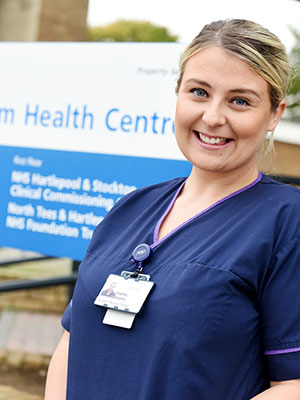Course overview
The apprentice has access to tutors with expert knowledge in their fields including clinical skills, leadership, prescribing and district nursing. Learning is structured around four areas: clinical practice, leadership and management, facilitation of learning and evidence, research and development. This reflects the field-specific standards set by The Queen’s Nursing Institute.
They gain theoretical learning alongside learners from a range of local Trusts, students on the full-time route and those on our non-medical prescribing course. They are encouraged to explore different perspectives and ideas, and share experiences of problem-solving in practice. Employers and the clinical learning team are supported by our course team to assist the apprentices’ learning in the placement area, through regular forums, websites, designated academic tutors and workplace quality coaches.
The apprentice is supported to achieve the best they can through tutorials, directed learning, Library resources, specific support from our Student Life team and other methods.
The apprentice studies this course while also having a full-time contract and being employed as an apprentice district nurse.
Use this helpful decision tool to decide which is the right district nursing course.
Please note, we can only respond to enquiries from employers, or individuals with agreement from their employer to undertake an apprenticeship.
Supporting information for applicants
Our School feedback policy (word - 278kb)
Our School reference policy (word - 276kb)
* Subject to University approval
Course details
Course structure
You learn key aspects of district nursing, including building a community profile, safeguarding, risk, teaching and learning, promoting independence, the experience of service users and carers, and understanding associated research.
You incorporate the professional district nursing proficiencies, management and leadership skills, developing service improvements, patient safety and understanding research methodology for project design.
Advancing Non-medical Prescribing
Independent and supplementary prescribing is an integrated feature of health service delivery. Some health-specific professionals are qualified to prescribe across a range of healthcare settings. Advancing roles within both nursing and allied health professions have provided a greater access to medicines. This award provides nurses and allied health professionals (physiotherapists, radiographers, podiatrists, dietitians, and paramedics who are working in advanced practice roles) with the knowledge and skills to prescribe safely and effectively. You must work within your own scope of practice and area of competence and be able to complete the care cycle in a holistic manner for clients within your care.
Physical Assessment Skills with a Focus on Long Term Conditions
You explore clinical assessment and management skills for key long-term conditions, drawing on current guidelines and practice.
Modules offered may vary.
How you learn
The apprentice learns through lectures, seminars, laboratory-based learning, tutorials, small-group work, practical skills-based sessions, guided independent study and work-based learning. Teaching is delivered by lecturers and specialists in their fields or external speakers, providing a rich learning experience. Learning in placement is in the employing Trust’s services where the apprentice is encouraged to negotiate to use their on-the-job learning time, gaining insight into the Trust’s services and structures.
How you are assessed
Assessment includes an OSCE, essays, verbal tasks, presentations, portfolios, exams and assessment of proficiencies in practice. All modules include the opportunity for formative feedback while the apprentice progresses. Work is generally submitted online with online feedback. The apprentice reviews their progress at the end of the first year and prepares for their next stage of learning. On successful completion of the course, they are awarded through an academic assessment board and with a fully integrated end-point assessment.
Entry requirements
To be accepted on to an apprenticeship course you must have support from your employer and meet the course entry requirements.
Apprentices must:
> have an NMC-valid registration as a registered nurse and at least one year’s experience post-registration
> have a degree or RPL equivalent
> be able to provide evidence of achievement of Level 2 qualifications in English and maths before starting their apprenticeship
> be professionally practising in a role where there is an identified need to prescribe, including at least one year in the clinical field in which they intend to prescribe
> be approved by the employing Trust or organisation’s non-medical prescribing lead and service manager who must provide verification of the apprentice’s suitability to prescribe
> have an NMP practice assessor or designated prescribing practitioner to provide supervision, support and opportunities to develop competence in practice
> pass a 20-question drug calculations entry test with a mark of 80% or above
> complete an interview with their employer and the University and must have a satisfactory enhanced DBS disclosure.
Apprentices may take part in an occupational health work-based risk assessment check. If they have a disability, specific learning difficulty, mental health condition, autism spectrum condition, sensory impairment or medical condition that may require reasonable adjustments during an external placement or in the university or a clinical practice area, this must be declared as part of the enrolment process. Contact the relevant admissions or course tutor for guidance.
Recognition of Prior Learning (RPL)
If you have already achieved some of these modules then it is possible to access the RPL processes offered by Teesside University to have this prior achievement acknowledged. Please see separate information regarding this process available on the website.
For general information please see our overview of entry requirements
Employability
Career opportunities
Successful apprentices can apply for a district nurse post as team leader and specialist practitioner, and develop professionally and academically with a master’s level qualification.
Work placement
Placements are in the employing Trust’s community nursing service.


